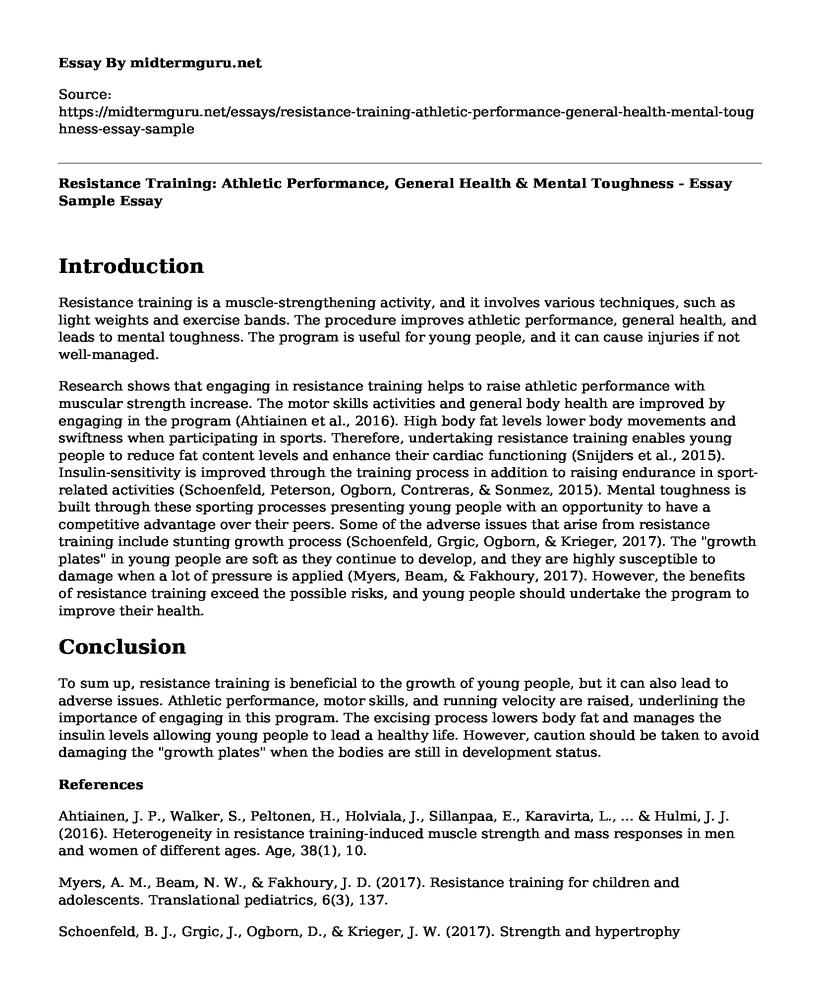Introduction
Resistance training is a muscle-strengthening activity, and it involves various techniques, such as light weights and exercise bands. The procedure improves athletic performance, general health, and leads to mental toughness. The program is useful for young people, and it can cause injuries if not well-managed.
Research shows that engaging in resistance training helps to raise athletic performance with muscular strength increase. The motor skills activities and general body health are improved by engaging in the program (Ahtiainen et al., 2016). High body fat levels lower body movements and swiftness when participating in sports. Therefore, undertaking resistance training enables young people to reduce fat content levels and enhance their cardiac functioning (Snijders et al., 2015). Insulin-sensitivity is improved through the training process in addition to raising endurance in sport-related activities (Schoenfeld, Peterson, Ogborn, Contreras, & Sonmez, 2015). Mental toughness is built through these sporting processes presenting young people with an opportunity to have a competitive advantage over their peers. Some of the adverse issues that arise from resistance training include stunting growth process (Schoenfeld, Grgic, Ogborn, & Krieger, 2017). The "growth plates" in young people are soft as they continue to develop, and they are highly susceptible to damage when a lot of pressure is applied (Myers, Beam, & Fakhoury, 2017). However, the benefits of resistance training exceed the possible risks, and young people should undertake the program to improve their health.
Conclusion
To sum up, resistance training is beneficial to the growth of young people, but it can also lead to adverse issues. Athletic performance, motor skills, and running velocity are raised, underlining the importance of engaging in this program. The excising process lowers body fat and manages the insulin levels allowing young people to lead a healthy life. However, caution should be taken to avoid damaging the "growth plates" when the bodies are still in development status.
References
Ahtiainen, J. P., Walker, S., Peltonen, H., Holviala, J., Sillanpaa, E., Karavirta, L., ... & Hulmi, J. J. (2016). Heterogeneity in resistance training-induced muscle strength and mass responses in men and women of different ages. Age, 38(1), 10.
Myers, A. M., Beam, N. W., & Fakhoury, J. D. (2017). Resistance training for children and adolescents. Translational pediatrics, 6(3), 137.
Schoenfeld, B. J., Grgic, J., Ogborn, D., & Krieger, J. W. (2017). Strength and hypertrophy adaptations between low-vs. high-load resistance training: a systematic review and meta-analysis. The Journal of Strength & Conditioning Research, 31(12), 3508-3523.
Schoenfeld, B. J., Peterson, M. D., Ogborn, D., Contreras, B., & Sonmez, G. T. (2015). Effects of low-vs. high-load resistance training on muscle strength and hypertrophy in well-trained men. The Journal of Strength & Conditioning Research, 29(10), 2954-2963.
Snijders, T., Res, P. T., Smeets, J. S., van Vliet, S., van Kranenburg, J., Maase, K., ... & van Loon, L. J. (2015). Protein ingestion before sleep increases muscle mass and strength gains during prolonged resistance-type exercise training in healthy young men. The Journal of nutrition, 145(6), 1178-1184.
Cite this page
Resistance Training: Athletic Performance, General Health & Mental Toughness - Essay Sample. (2023, Feb 09). Retrieved from https://midtermguru.com/essays/resistance-training-athletic-performance-general-health-mental-toughness-essay-sample
If you are the original author of this essay and no longer wish to have it published on the midtermguru.com website, please click below to request its removal:
- Role and Purpose of Clinical Supervision - Paper Example
- Discussion Questions on Doctor of Nurse Practice as a Healthcare Leader - Paper Example
- Public Health Essay: The Fat Man Problem
- Questions and Answers on Human Factors and Errors in Public Health - Paper Example
- Reducing the Number of Readmission of Patients - Paper Example
- Essay Sample on Systemic Lupus Erythematous
- Tailor-Made Solutions: Healthcare Professionals Embrace Case Management for Diabetes - Essay Sample







